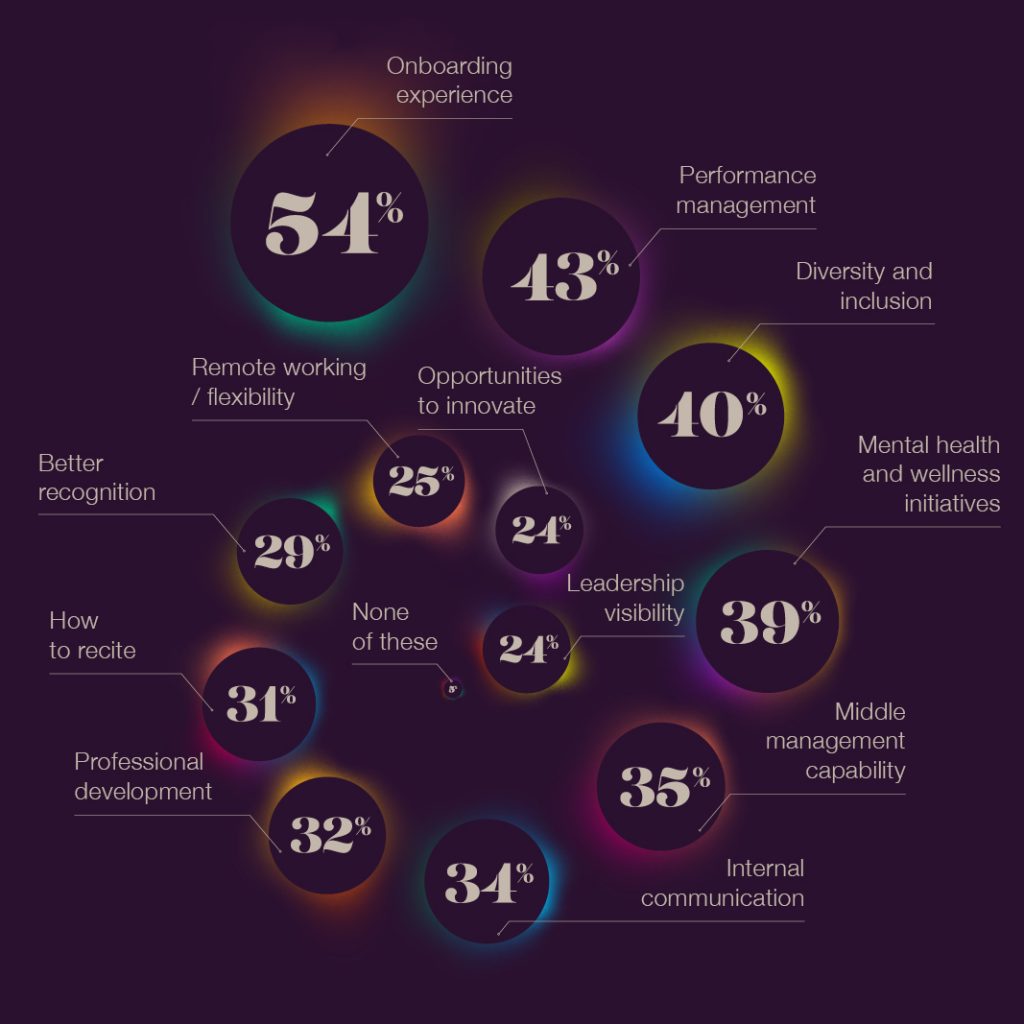These days we’re finding ourselves having more and more conversations about employee experience – so we decided to launch Roundel 2020, a piece of global research to understand the trends, practices and priority areas.
Our workplaces are in the midst of huge transformation and businesses are realising they need to do things differently. One of the questions we asked respondents was which key moments within the employee experience is your organisation focusing on in 2020? This is what they said…

Let’s dig deeper into the top four 2020 employee experience focus areas…
1) 54% of respondents are reviewing their onboarding experience
Sometimes a new job doesn’t quite live up to an organisation’s external brand proposition. If there’s a mismatch between expectations and the reality of being a new entrant, high turnover levels within the first two years of employment tends to be the natural outcome.
Onboarding is a vital part of employee experience. Designing a best-in-class onboarding experience is so much more than an offer letter and filling in a few forms on your first day. It’s about seamlessly supporting new hires to become successful corporate citizens, sooner rather than later. And it’s not just enough to get the basics right – they’re an expected given.
If you’re thinking about redesigning your onboarding experience, then killer questions to ask yourself are:
- How can we bring our brand values to life in unexpected ways across the first 30, 60 and 90 days?
- How can we delight our new entrants on their first day in a way that’s meaningful and ownable to us?
- If they were a customer looking inside our organisation what first impressions would we want them to have?
2) 43% are reviewing performance management
Performance management has been a massive theme here at Home over the past few years. We’ve helped many clients evolve towards continuous, live, ‘in the moment’ performance conversations rather than a formal annual review process.
We know high-performing employees thrive in learning cultures where performance is always at the heart of their experience – valued and celebrated when things are going well, supported and structured when things are a bit tougher.
3) 40% are prioritising their approach to diversity and inclusion
There’s no doubt that the battle for equality in the workplace has come a long way in the past few years, but there are still huge challenges ahead. Gender equality and support for LGBTQ+ staff have been the focus of many organisations. The challenge is to support BAME employees and to become truly inclusive for those with disabilities.
Storytelling about successful leaders, managers and employees from disability groups is a great way to change the narrative about what it takes to succeed in your organisation. Keep shining a light on any positive pockets of brilliance you can find, until these stories are no longer surprising.
Use education to challenge social norms your people aren’t even aware of. Training for unconscious bias can do wonders to help us be mindful of the paradigms we see the world through, completely unknowingly. And once you know, it’s difficult to ignore.
4) 39% are focusing on mental health and wellness
More and more of our clients are talking about burnout and trying to understand what it is about their culture and way of working that leads to it.
We’re working with some fantastic leading organisations, where the focus on wellbeing is leading to huge changes. With an ever-increasing awareness, understanding and openness around mental health, it will be fascinating to see how this area continues to develop.
Right now, forward-thinking organisations are making positive steps such as:
- Developing internal programmes to break the stigma around mental health, highlighting the benefits of open, honest mental health conversations at work
- Encouraging people to look out for each other, raising awareness of signs to look out for
- Giving access to support if things go wrong
- Adopting flexible working practices to help empower people
If you like what you’ve read here then you can access the full report for free.





 Back to all
Back to all




